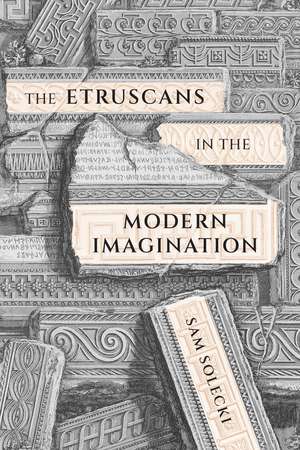The Etruscans in the Modern Imagination: McGill-Queen's Studies in the History of Ideas, cartea 85
Autor Sam Soleckien Limba Engleză Hardback – 20 oct 2022
The Etruscans, a revenant and unusual people, had an Italian empire before the Greeks and Romans did. By the start of the Christian era their wooden temples and writings had vanished, the Romans and the early church had melted their bronze statues, and the people had assimilated. After the last Etruscan augur served the Romans as they fought back the Visigoths in 408 CE, the civilization disappeared but for ruins, tombs, art, and vases.No other lost culture disappeared as completely and then returned to the same extent as the Etruscans. Indeed, no other ancient Mediterranean people was as controversial both in its time and in posterity. Though the Greeks and Romans tarred them as superstitious and decadent, D.H. Lawrence praised their way of life as offering an alternative to modernity. In The Etruscans in the Modern Imagination Sam Solecki chronicles their unexpected return to intellectual and cultural history, beginning with eighteenth-century scholars, collectors, and archaeologists. The resurrection of this vanished kingdom occurred with remarkable vigour in philosophy, literature, music, history, mythology, and the plastic arts. From Wedgwood to Picasso, Proust to Lawrence, Emily Dickinson to Anne Carson, Solecki reads the disembodied traces of Etruscan culture for what they tell us about cultural knowledge and mindsets in different times and places, for the way that ideas about the Etruscans can serve as a reflection or foil to a particular cultural moment, and for the creative alchemy whereby artists turn to the past for the raw materials of contemporary creation. The Etruscans are a cultural curiosity because of their disputed origin, unique language, and distinctive religion and customs, but their destination is no less worthy of our curiosity. The Etruscans in the Modern Imagination provides a fascinating meditation on cultural transmission between ancient and modern civilizations.
Preț: 303.86 lei
Nou
Puncte Express: 456
Preț estimativ în valută:
58.16€ • 63.20$ • 48.89£
58.16€ • 63.20$ • 48.89£
Carte disponibilă
Livrare economică 31 martie-14 aprilie
Livrare express 14-20 martie pentru 44.16 lei
Preluare comenzi: 021 569.72.76
Specificații
ISBN-13: 9780228014638
ISBN-10: 0228014638
Pagini: 344
Ilustrații: 15 photos
Dimensiuni: 152 x 229 x 30 mm
Greutate: 0.66 kg
Editura: McGill-Queen's University Press
Colecția McGill-Queen's University Press
Seria McGill-Queen's Studies in the History of Ideas
ISBN-10: 0228014638
Pagini: 344
Ilustrații: 15 photos
Dimensiuni: 152 x 229 x 30 mm
Greutate: 0.66 kg
Editura: McGill-Queen's University Press
Colecția McGill-Queen's University Press
Seria McGill-Queen's Studies in the History of Ideas
Recenzii
"A virtuosic investigation into the long disappearance and gradual rediscovery of a civilization given up for lost. The elusive strangeness of the Etruscans, in Solecki’s telling, relative to the all too familiar accounts of the glory that was Greece and the grandeur that was Rome, has given them a special power to fascinate and stimulate the inquisitive modern mind.” Literary Review of Canada
“[The Etruscans in the Modern Imagination] provides a rare opportunity to hear the views of a specialist from another discipline, that of film studies, and to enjoy the author’s extensive knowledge of 19th- and 20th century art and literature, the ‘modern imagination’ referred to in the title. Solecki’s detailed analysis in each chapter is laser-focused on the artist or writer’s engagement with the Etruscan world, and there are lengthy and enjoyable quotations presented to illustrate this. The annotated catalogue of ‘Etruscan sightings’ with which the book ends is an incredibly valuable resource for those interested in Etruscan reception studies.” Minerva Magazine
Notă biografică
Sam Solecki is professor emeritus at the University of Toronto and the author of A Truffaut Notebook.
Descriere
The Etruscans, a revenant and unusual people, had all but disappeared by the start of the Christian era. Sam Solecki chronicles their unexpected return to the intellectual and cultural history of the west, beginning with eighteenth-century scholars, collectors, and archaeologists, to provide a fascinating meditation on cultural transmission between ancient and modern civilizations.












